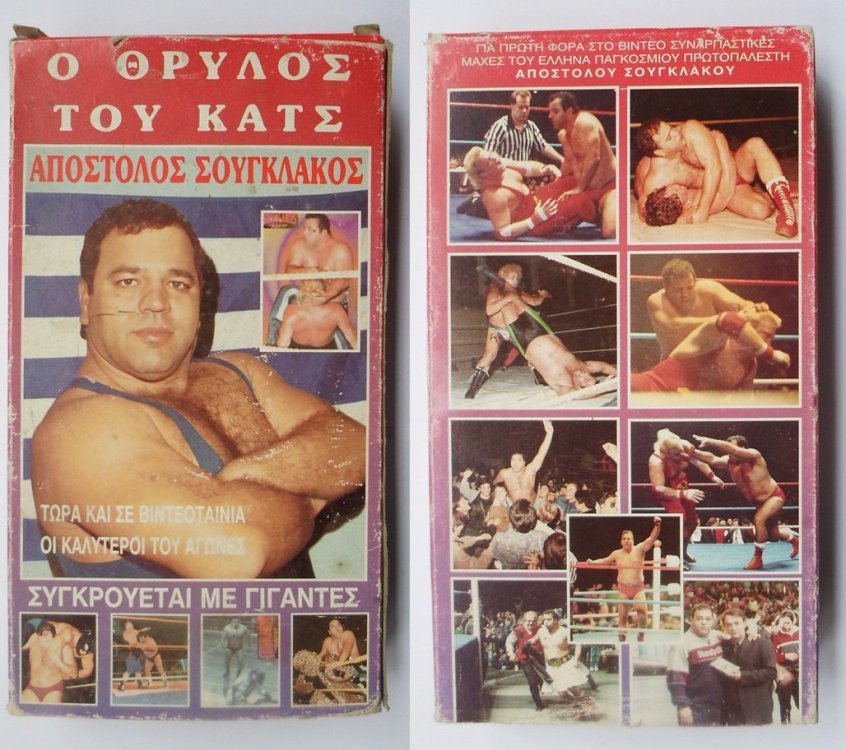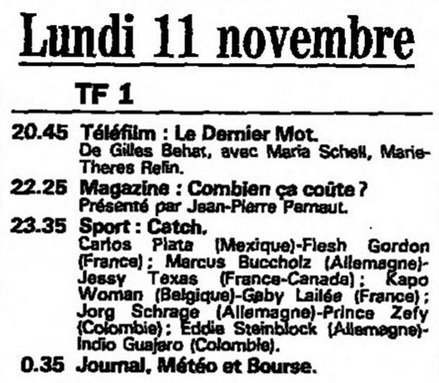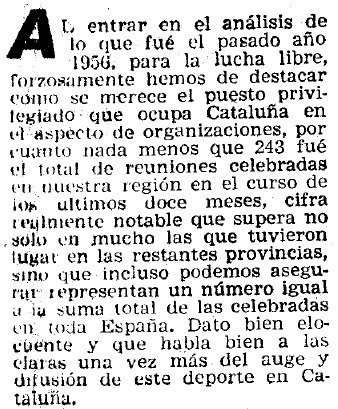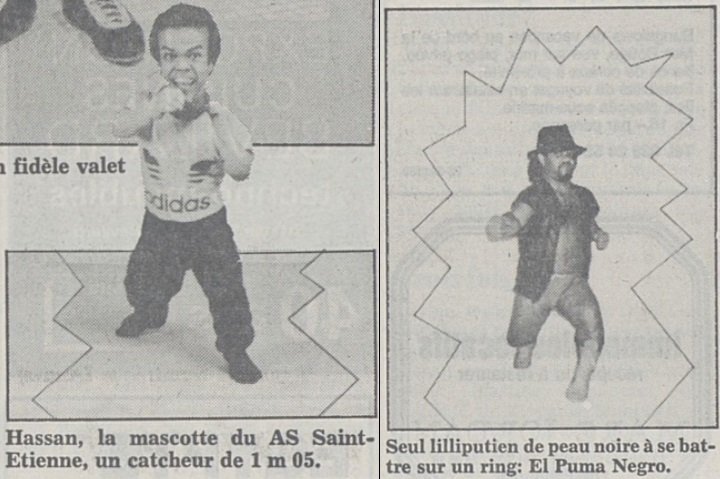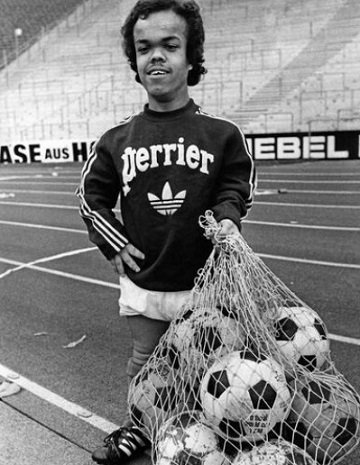
Phil Lions
Members-
Posts
220 -
Joined
-
Last visited
Content Type
Profiles
Forums
Blogs
Everything posted by Phil Lions
-
Ah, yes! Great catch, thanks! Got my years on the launch of FR3 mixed up somehow.
-
Cheap plug. If last year you enjoyed listening to me blabber on about Gilbert Leduc on a podcast, here's me now talking about Le Petit Prince in detail as well. The first half of the podcast covers the life and career of Le Petit Prince, then we get into discussing him from the perspective of the WON HOF (since he'll be on the ballot this year), and finally we talk about other European names on the ballot such as Jose Tarres, Otto Wanz and Andreas Lambrakis. Link: The Ballot: Le Petit Prince with Phil Lions It's also available on YouTube and all the usual podcast platforms.
-
Catch TV in Switzerland, Luxembourg and Monaco (1950s-1960s)
Phil Lions replied to Phil Lions's topic in Pro Wrestling
I think it was probably original unaired matches, but hard to say for sure without knowing exactly what matches aired each week. There was definitely commentary. Sometimes the TV listings would mention the commentator. In the case of Monaco in 1955 there's three names mentioned and off the top of my head I don't recognize either one of them as someone who did catch commentary for French TV (although I could be wrong about that) so it seems it was a different commentary crew altogether. Again, I'm not sure about that. By that I mean I don't know if RTF taped the footage and then sold it or if TMC worked out a deal to come in and shoot it themselves. My best guess is the former, but I'm just guessing. -
Catch TV in Switzerland, Luxembourg and Monaco (1950s-1960s)
Phil Lions replied to Phil Lions's topic in Pro Wrestling
Not sure about the first part. It definitely wasn't the footage from the news. -
Catch TV in Switzerland, Luxembourg and Monaco (1950s-1960s)
Phil Lions replied to Phil Lions's topic in Pro Wrestling
France. Now some of this is an educated conjecture on my part, but based on everything I've read I believe this is how things worked and France was the sole source. The catch footage that aired in France was only a portion of what was actually filmed and most of the footage was airing outside of France in countries where catch was broadcast on TV on a much more regular basis compared to France (i.e. Switzerland, Luxembourg, Monaco). -
Catch TV in Switzerland, Luxembourg and Monaco (1950s-1960s)
Phil Lions replied to Phil Lions's topic in Pro Wrestling
I've updated the original post a little bit with some new research regarding Monaco. So here's a couple of fun stats: Catch TV broadcasts in France in 1954: 2 or 3 Catch TV broadcasts in France in 1955: 9 or 10 Catch TV broadcasts in Monaco in 1955: 30 In short, Monaco was the first place to start broadcasting French catch on a pretty regular basis. It wasn't until 1957 that France would start doing a similar number of broadcasts per year, and overall only a handful of years in the history of catch on French TV would reach those kinds of numbers. -
Roland Bock has passed away, at the age of 81.
-
Yeah, I sent that to Bob. 🙂 Valencia, 1951. In 1951 Gilbert Leduc (c) vs. Rene Ben Chemoul matches for the (FFL) World Welterweight Title took place in France, Spain, Germany, Morocco and possibly elsewhere too. The year prior Leduc had become the first Frenchman to win a catch World Title in France and by the looks of it Goldstein was using his influence to get Leduc featured as World champion in as many places as possible. That wasn't Quasimodo (Victor Castilla). That was Eduardo Castillo, who was actually a bigger star than Victor Castilla in Spain. Yep, Salvador Font. Also notice Cabeza de Hierro (Jose Tarres) in the semi-main.
-
^ That's Vic Hessle vs. Paul Leteurtrois. October 15, 1948, at Cirque d'Hiver. More footage from the same match:
-
The Spanish wrestlers' union was linked to the artists/entertainment union (Sindicato Nacional de Espectaculo) and it had somewhere between 30 to 70 members. The wording in the article that I found about its formation in October 1969 is a bit vague. "About thirty professionals out of the seventy in Spain attended the meeting, but it is necessary to clarify that the absences were equally represented in the letters of support that those not present sent to their colleagues." One of the main issues they wanted to fight against was the Spanish promoters hiring too many foreign wrestlers, thus limiting the work for the Spanish wrestlers. One of the big talking points in press around the formation of the union was how the Spanish wrestlers beat the Spanish footballers to the punch since recently there had been a lot of talk of the football players unionizing too.
-
There was the odd show here and there after that too, but more or less yes - you could say that 1986 was the end of the "lucha libre americana" era in Spain since that's when the last notable Spanish promotion closed shop. Although funnily enough, when WWF came to Spanish TV and the "Pressing Catch" branding was introduced, in the TV listings they'd still make sure to list it as "lucha libre americana" too since that was the most common name for pro wrestling in Spain up to that point. This is from September 1990:
-
Yes. Quasimodo (Victor Castilla Sancha) and the Argentine wrestler Gran Jacobo (Jacobo Rossi Sarrat) ran the "Los Colosos del Ring" promotion in Spain. It was in operation from 1974 to 1986. A few years before that Castilla served as vice-president of the first Spanish pro wrestler union (which was formed in 1969). Here are Castilla and Rossi posing with a few of their wrestlers at their wrestling school in Fuenlabrada in 1984:
-
Ah, okay. I see. I thought you meant that was his real name (which it wasn't). Yeah, he dropped the Quasimodo gimmick in France and went by Vicente Castilla in 1964-1966.
-
Not sure where you got that name for Quasimodo from. It's wrong. His name was Victor Castilla Sancha. Yeah, 1934-1936.
-
I had a hunch the popular radio personality Bobby Deglané, the commentator for this match, had to have some connection to wrestling. He was just too good at wrestling commentary here. But I hadn't really looked into it. Today I randomly found the connection. Turns out back in the mid 1930s Deglané got his start in Spanish radio by specializing in the broadcast of wrestling matches and was reportedly the first one to do wrestling commentary on Spanish radio. These were the early days of Spanish lucha libre (known as catch in the 1930s in Spain but later they switched to lucha libre americana as the most common name for it) and he did reports on wrestling matches for the radio in Madrid, Barcelona and Valencia. cc: @Matt D
-
Three: - March 20, 1976: Kader Hassouni & Claude Roca vs. Bernard Caclard & Albert Sanniez + Mr. Montreal vs. Inca Wiracocha - April 30, 1976: no specific matches advertised - August 7, 1976: Bob Plantin vs. Fred Magnier + Antonio Pereira vs. Jean-Claude Bordeaux + Michel Chaisne vs. Michel Di Santo
-
The ones in bold - TF1. The rest - A2. The last TF1 broadcast that I have a record of is from October 15, 1977 (Zarak vs. Jean-Pierre Le Comte + Le Petit Prince vs. Albert Sanniez). INA has two additional shows from 1978 (April 4 and May 17) in their TF1 archive, and the footage is out there already, but INA's actually got those two listed as "taped" as opposed to "broadcast" so it looks like those two were taped for TF1 but not aired on TF1.
-
Now that the new footage well has dried up, it's a good moment to post this. Here's a list of French catch matches that most likely aired on TV, but we don't have the footage. Some of these I have mentioned previously. I say "most likely" because these were advertised in the TV listings, but there's always a possibility a different match may have aired instead or there might have been no catch broadcast at all that night. It didn't happen often, from what I can tell, but last minute changes definitely happened on occasion. I'm also including a few matches that I've seen mentioned on live event posters as being TV rematches, and a few that were in the TV listings but I don't think they aired. - March 22, 1954: Primo Carnera vs. Hermann Reiss + Francois Miquet vs. The Great Zorro [first ever live broadcast] - March 20, 1959: L'Ange Blanc vs. Roger Guettier [advertised, but likely didn't air because the masked wrestler TV ban came into effect right before this] - April 26, 1959: Pierre Boss vs. Ami Sola [as part of "Télé-dimanche"] - June 27, 1959: Gaby Calderon vs. Karl von Chenok [I'm guessing it didn't air] - July 23, 1959: Jacky Corn & Roger Laroche vs. Pierre Bernaert & Eric Husberg - February 26, 1960: Roger Delaporte vs. Jose Arroyo + Robert Duranton vs. Lino Di Santo - November 4, 1960: L'Homme Masque vs. Ray Hunter + [potentially part of] Dr. Adolf Kaiser vs. Al Hayes - March 11, 1963: Roger Delaporte vs. Rene Ben Chemoul + Andre Bollet vs. Jimmy Dula - October 3, 1963: Vega Dingo vs. Cheri Bibi + L’Ange Blanc & Gilbert Leduc vs. Robert Gastel & Jack de Lasartesse - November 25, 1963: Roger Delaporte & Andre Bollet vs. Pat O’Conor [Murius Servais] & Mr. Montreal - January 23, 1964: Ricki Starr vs. Robert Gastel - January 30, 1964: Hercules Cortez vs. Le Grand Vladimir + Andre Drapp & Mr. Montreal vs. Roger Delaporte & Pierre Bernaert - April 10, 1964: Ricki Starr vs. Ski Hi Lee - before July 12, 1964: Roger Delaporte & Pierre Bernaert vs. Mr. Montreal & Lino Di Santo [listed as a TV rematch on a poster] - October 9, 1964: L'Ange Blanc & Gilbert Leduc vs. Hercules Cortez & Robert Gastel - January 23, 1966: Le Petit Prince vs. Michel Falempin - December 4, 1966: Guy Mercier vs. Roger Molar - February 26, 1967: Rene Ben Chemoul & Walter Bordes vs. Daniel Boucard & Jose Gonzales - March 26, 1967: Kamikaze vs. Gilbert Cesca - 1968 or 1974: Le Petit Prince vs. Kamikaze [listed as a TV rematch on a poster, year not clear] - April 26, 1969: Jean Corne & Jean Mahieu vs. Michel Falempin & Serge Reggiori - January 11, 1971: Gilbert Leduc, Jacky Corn & Guy Mercier vs. Les Kamikazes & Jo Marsallon [also listed for January 25] - June 13, 1974: Robert Duranton & Firmin vs. Jean Corne & Michel Falempin - August 29, 1974: Rene Ben Chemoul & Walter Bordes vs. Les Green Squal’s - November 30, 1974: Bobby Genele vs. El Kaci - 1975: Zarak vs. Mr. Montreal [exact date unknown] - March 8, 1975: Zarak vs. Jamaican Jo + Michel Debyser vs. Paco Ramirez - May 24, 1975: Le Petit Prince & Angelito vs. Jacky Richard & Zoltan Boscik - June 28, 1975: Johnny Saint vs. Michel Falempin + Zarak vs. Michel Debyser - January 19, 1976: Walter Bordes vs. Daniel Boucard - March 28, 1976: Inca Wiracocha vs. Batistou - February 19, 1977: Michel Di Santo vs. Rudy Croser [likely didn't air] - February 27, 1977: Jose Gonzales vs. Gerard Taysse - June 12, 1978: Jacky Corn vs. Jacky Richard + Gilbert Leduc vs. Zorba - October 22, 1978: Zorba vs. Jean Menard - before April 21, 1979: L’Ange Blanc & Eddy Mores vs. Robert Duranton & Firmin [listed as a TV rematch on a poster] - December 7, 1981: Walter Bordes & Claude Roca vs. Anton Tejero & Albert Sanniez - August 7, 1982: Guy Mercier & Jean Corne vs. Jacky Richard & Guy Renault [only footage of the finish is available] All in all, there seem to be over 150 French catch broadcasts (from 1954 to 1985) that we don't have footage of. Most of them, unfortunately, are only listed as "Catch" in the TV listings and there's no mention of the matches that were to air. In the list above I didn't include some matches that I think were likely repeats. For example, the TV listings mention a Duranton/Lamar match airing in 1972 and 1974. INA has a Duranton/Lamar match from 1973. I highly doubt three different Duranton/Lamar matches aired on TV in consecutive years. I think most likely it was one match that was re-broadcast a couple of years later, and INA's date is wrong (the TV listings have Leduc & Corn vs. Fryziuk & Schmid airing on that night in 1973). I'll also say that in comparing the TV listings with the INA dates it becomes apparent that some of the INA dates are the taping dates, not the air dates. I'm too lazy to make a list of the discrepancies though.
-
While on the topic of Souglakos VHS tapes, this one was knocking around online on a couple of occasions. Had a chance to buy it and thought about it, but passed. Not sure if it's the same tape as the one above as this one seems to feature Souglakos' match from the NWF show in 1991 (versus the blonde guy in the red singlet) and that match is not featured in the video above.
-
Ah, good catch! Thanks. I had read this incorrectly in my notes. I'll correct it now. New Catch in 1991 on TF1 was its own standalone show, for those four weeks. "3ème mi-temps" was the magazine show that aired the Parmentier brothers tag on local Reims TV.
-
While on the topic of Spanish lucha libre, here's a fun stat that I just randomly came across. According to this Barcelonian article from early 1957, in 1956 there were a total of 243 shows in the Catalonia province. The most out of any Spanish province, according to the article. And keep in mind, either 36 or 37 of those shows were held at the two Barcelona bullrings (a 14,893-seater and a 19,582-seater).
-
Yep, like David said, Sky (who already had a deal with WWF in the UK) co-owned Eurosport until May 1991 when TF1 replaced them as co-owners of the network. Back in that 1989-1991 period Eurosport was airing the syndicated WWF TV shows like Superstars of Wrestling and Prime Time Wrestling, but also showing some of the PPVs too. For example, I came across WrestleMania VI and VII airings (90-minute broadcasts, about a month and half to two months after the PPVs had taken place). Doesn't look like it was a preview - it looks like in 1991 it was already airing on Eurosport, before it aired on TF1.* The history of New Catch on TV goes like this: - October through December 1988 (part of "Minuit sport” on TF1, New Catch actually replaced AWA and was then replaced by WCCW) - September or October 1991 through May 1992 (New Catch on Eurosport) - November 1991 (on TF1, only four episodes) * I say it looks like, because I can't 100% confirm what was airing on Eurosport in September and October 1991. The September listings say "Wrestling". In October it's "Wrestling from Europe". First mention of "New Catch" on Eurosport is December 3, which coincidentally is the last TF1 date too. I guess it's possible some CWA stuff may have aired in September and October, but I think most likely it was New Catch and they just hadn't started listing it like that in the listings. ----------- Another thing that struck me while researching this is how many upstart European TV networks used wrestling as featured programming to establish themselves on the market. Sky Channel launches in the UK in 1984 - they immediately start airing WWF. Canal Plus launches in France in 1984 - within 9 months they start airing WWF. Eurosport launches in 1989 - within a few months they start airing WWF. DSF launches in Germany in 1993 - they start airing WCW and GLOW right away. Etc.
-
Speaking of the midget wrestlers, I just randomly stumbled upon this information while looking for something else. Hassan, apparently, used to be the mascot for the AS Saint-Etienne football club. Saw this mentioned in a 1988 article for a FEC show. Then I googled it and the second photo below popped up. It's said to be from 1976 and lists him as Hassam Handami (it's probably Hassan and they misspelled it).
-
This book is from 1947. I have a scanned copy of it.



